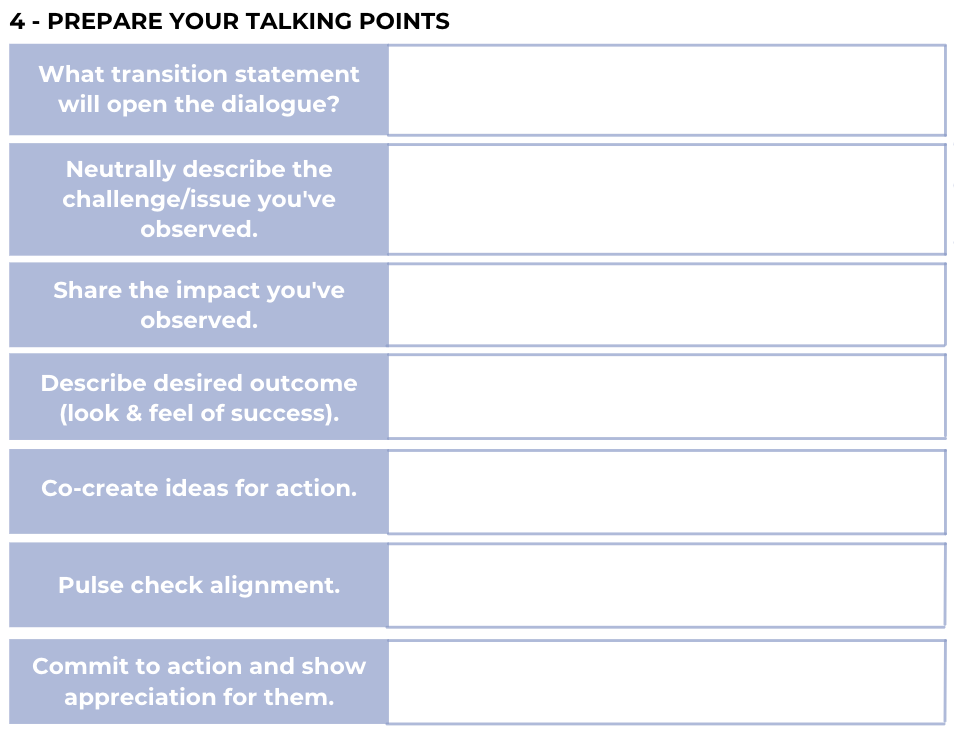How To Make Difficult Conversations Less Difficult
A practical guide—and free Conversation Planner—for handling tough management conversations with less stress and more impact.
A huge THANK YOU to everyone who read and shared last week’s Why You Keep Jumping In, Playing Nice, or Holding Back.
To date, it was my most read post and I’m grateful!
Last week we saw how your inner game drives your outer game. Now let’s see how that specifically plays out with difficult workplace conversations.
Ever wish difficult conversations weren’t so difficult?
Buckle up…cause today’s post will make your management life easier.
A few important dates before we dive in:
April 30th - early bird pricing expires - Leadership Retreat For Women
May 8th, 9am PST - 1 hr workshop Succeeding In Difficult Conversations With People With Defensive Tendencies. Just $75.
May 13th - next cohort of Fearless Feedback Mastery begins
Let’s set you up for difficult conversations being less difficult.
Here’s our lineup:
3 Game Changing Mindset Shifts
4 Step Conversation Prep
Conversation Planner Access
A powerful quote to set the tone:
“The best things in life are on the other side of a difficult conversation.” - Daniel Coyle, The Culture Playbook
Mindset - Yes, Mindset
When you tell yourself something sucks, does it generally suck?
Our mindset shapes our approach, execution, and completion of a task.
Wednesday morning I did an intervals run. I had two choices:
Keep telling myself it’s hard
Remember that intervals make athletes
Guess which one served me and my desired outcome.
Mindset matters.
Here are 3 shifts that will impact your Mindset (and outcomes):
1. Don’t Call Them Difficult
Change the word. Is this a necessary conversation? Will this be a high impact conversation?
If the nature of calling it a “Difficult Conversation” psyches you out, stop calling it that.
Just like I don’t call my hard runs, “hard runs,” I turn it around to what I’m going to get, who I’m going to become on the other side.
2. Would You Want To Know?
If you were on the other end of the conversation, if you were on the receiving end of information that will impact your work, career, and development, would you want to know?
Yes.
Just like having food in your teeth - others see it, you don’t - and you always want to know if you’ve got a chunk of lettuce chillin’ in your front teeth.
Feedback is the same way. We want to know.
Tough news is the same way. We want to know.
3. Trust They Can Handle It
Much of our worry about these conversations stems from fear of their reaction.
You know what’s interesting?
Most of us default to assuming they can’t handle it.
How crummy does it feel when we sense someone thinks we can’t handle something?
Flip it on its head.
Assume they CAN handle it. Assume they’re a strong adult invested in being their best.
Pause here - which of these mindset shifts resonates the most with you? Will you leverage at least 1 of these next week?
Prepare Like A Pro - 4 Step Prep
Things feel less difficult when you’re prepared.
In the context of work conversations, being prepared means:
Getting your head right
Understanding the core challenge you’re addressing
Having clarity on your desired outcome
Considering your talking points & word choices
That’s where a Conversation Planner can help, and I’m happy to share mine as a free resource for you today.
I’m going to utilize screenshots to highlight core elements, and you can access and download the pdf below.
Forcing yourself to pause and consider these 3 mindset questions gets you in the right headspace to continue preparing for the interaction.
Be honest with yourself about what’s really holding you back, reconnect to what’s in it for them, and strengthen your resolve by realizing you would likely want to know.
This next section purposefully pulls you away from your emotion and enables you to hone in on the heart of the upcoming conversation.
It’s the last 2 questions here that are game changers.
If nothing changes, what’s likely to happen?
What’s the role I’ve played in this situation?
The impact of these two questions:
You’re bringing into sharp focus what’s really on the line, in a way that’s balanced and more fair.
Now you can shift to thinking about your end-game:
People don’t have a crystal ball to know what you want.
You’ve got to tell them, but if you haven’t consciously paused to consider:
what you want and,
what signals might indicate improvement
Then you’re going to have an incomplete conversation.
It’s after these thoughtful reflections that you can now start identifying what you want to say. This can be a powerful flow:
A few particular call-outs:
Transition Statement
You’ll more successfully open a feedback or performance conversation when your transition:
Is about them & their success
Sends a message of good intent
Asks permission to dive in
Co-Create Actions
In tough situations, managers often feel they need to come in with ALL the action steps.
No.
Co-create with your people.
What ideas do they have for making progress in this area?
What’s on their mind for how they might address xyz?
What do they want to propose as a first step?
Commit & Appreciate
Wrap up the conversation with alignment and gratitude.
Verbally summarize what you each are doing moving forward, and thank them.
Thank them for their openness.
Thank them for their willingness.
Ensure they’re walking away feeling respected and appreciated for how they showed up in a difficult moment.
Conversation Planner
Take your feedback, performance management, and change management conversations to the next level with my Conversation Planner.
I’m happy to make it available to my Subscribers.
You can view and download here.
Summary
If you’ve ever found yourself avoiding feedback, softening your message, or waiting too long to address an issue—you're not alone. Difficult conversations can feel less difficult with the right mindset and preparation.
Today, we covered:
3 Mindset Shifts to reframe your approach and reduce dread
A 4-Step Conversation Prep to help you clarify your message and stay focused
A Free Conversation Planner you can use to walk into your next conversation with confidence
These tools are here to help you show up as a stronger, more effective manager—one conversation at a time.








